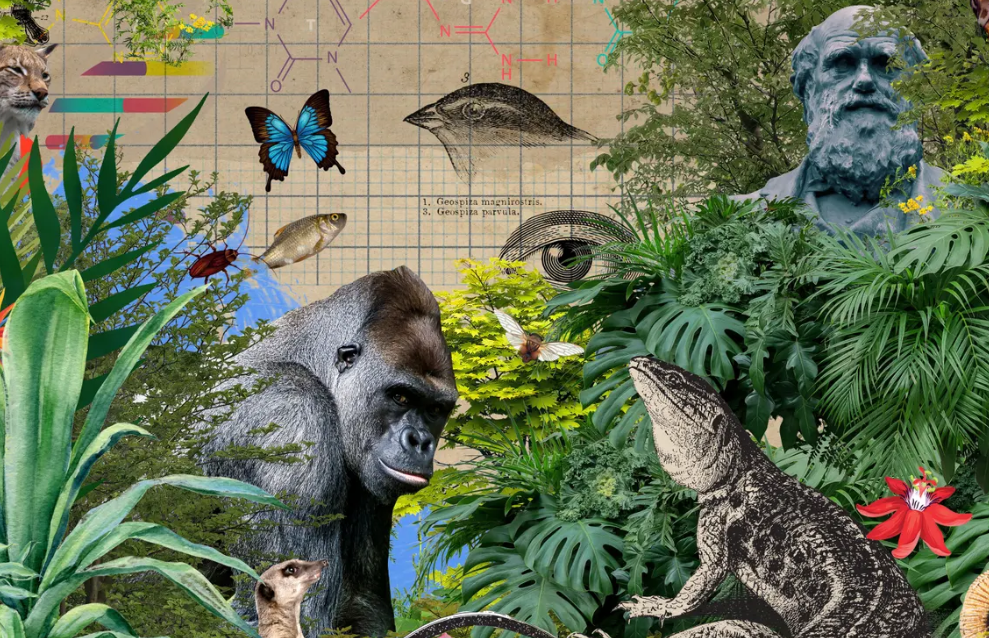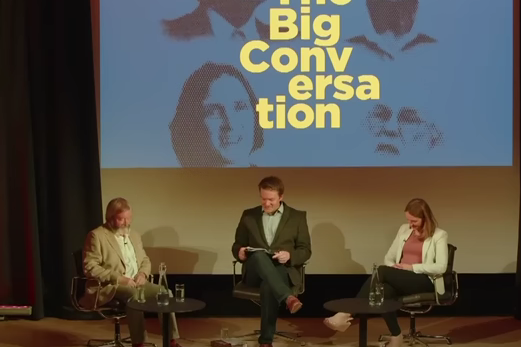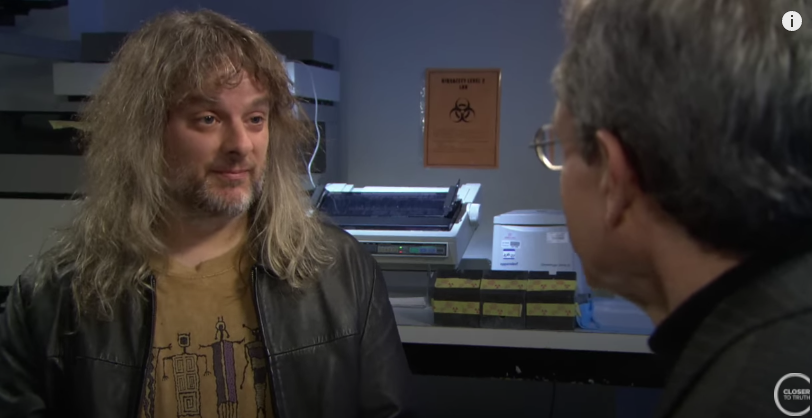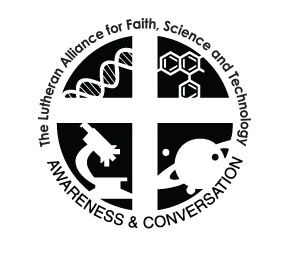Greetings, WesleyNexus Colleagues:
In reading the Firebrand magazine article by Shirley Mullen, President Emerita of Houghton College (included below), one is reminded that the Wesleyan tradition is both wide and deep. From the beginning it stressed the idea of personal holiness, community engagement in social problems and the importance of ongoing education and learning. WesleyNexus was formed to emphasize the importance of all three dimensions. Through the articles we include in our newsletter, in the programs we sponsor and the organizations we promote, WesleyNexus presents to our participants a wide variety of perspectives. By doing so, we affirm the range and openness of the Wesleyan tradition. We hope you find something in this month’s issue that touches your spirit, your conscience and your mind.
Contents:
IRAS Webinar: Evolutionary Consequences of the Nature’s Scripture with JD Stillwater
Evolutionary Consequences of the Atlantic Slave Trade: Epi-genetic, Cultural, Medical and Spiritual with Dr. Fatimah Collier Jackson, Ph.D.
The Challenges and Opportunities of Wesleyan Higher Education: Working Toward a Hopeful Future by Shirley A. Mullen
Do we need a new theory of evolution? by Stephen Buranyi
Iain McGilchrist & Sharon Dirckx • Brain science, consciousness & God
Why I Never Had a Faith Crisis Over Science by Deborah Haarsma
David Chalmers – Does Consciousness Defeat Materialism?
On finding lost books – Or, scientists and sin by George Murphy
Will You Go With Me to the Mountain Top by Rick Barr
Thanks continue to go out to our generous contributors. We encourage you to share comments, articles and insights that will help us all weather these difficult times.
Blessings,
Rick Barr and the rest of the WesleyNexus team
****************************************************************************************************
Evolutionary Consequences of the
Nature’s Scripture:
Cultural Insights from Natural Reality
with JD Stillwater
August 4, 2022, at
4:00 PM Central time,
5:00 PM Eastern time
Hosted by The Institute on Religion in an Age of Science
Presentation Overview:
At precisely the time when our cultural dysfunctions threaten the existence of life on Earth, the scientific worldview offers a sweeping vista of how creation works and how it came to be. In a global civilization on the brink of catastrophe, what if we aligned our norms and values, politics, economics, and religious sensibilities with how creation works? What insights can we glean from nature for shifting our worldview and repairing the world? JD Stillwater points to a few examples that are ubiquitous on Earth and in the cosmos, offering insights that are ripe for informing and enriching human cultures and systems. We’ll explore fundamental patterns in how creation works like inter-connection and wholeness, interdependence, relativity, cooperation, emergence, kinship, mortality, and ambiguity.
About the August 4th presenter:
A graduate of Cornell University, JD Stillwater is a Science Educator and founder of the Seven Candles: Science and Spirituality project. In 1986, JD and 350 of his closest friends walked from Los Angeles to Washington DC on The Great Peace March for Global Nuclear Disarmament. After the March, he worked as an activist, musician, stay-at-home father, house-builder, and camp director. When his children reached school age, JD returned to the classroom, too, teaching high school physics, biology, and earth/space science. By invitation, he then joined the faculty of a democratic K-12 school, teaching the sciences plus creativity, first aid/CPR, music, integrity, poetry, math, carpentry, mediation, backpacking, anti-racism, and leadership. An active member of the Unitarian Church of Harrisburg, PA, JD is a past president, musician, and frequent lay speaker. In 2012, he launched Seven Candles as a part-time mission to share the beauty and mystery of science with adult audiences, work that this year became a full-time endeavor. After 24 years in K-12 classrooms, his target audience now includes everyone.
To register for the August 4 webinar:
https://us02web.zoom.us/webinar/register/WN_VA6_5ag6SpiTPf9mgVdyQQ
****************************************************************************************************
IRAS Webinar Video
Jun 6, 2022
Evolutionary Consequences of the Atlantic Slave Trade: Epi-genetic, Cultural, Medical and Spiritual
Dr. Fatimah Collier Jackson, Ph.D.
About the May 12, 2022 webinar:
Presentation Overview:
Dr. Jackson is an expert on the bio-history of African peoples and their descendants in the transatlantic diaspora. She is widely recognized for her emphasis on interdisciplinary and integrative approaches to scientific research. In 2002, she co-founded the first human DNA bank in Africa (based at the University of Yaounde I in Cameroon) with the aim of changing the way that anthropological genetic research is done on the African continent (moving away from the colonial approach), enhancing local infrastructure and expertise, and dramatically improving the potential for scientific understanding of the interactions of genotypes and environmental factors in producing specific phenotypes (by providing a local context for data analysis and interpretation). Dr. Jackson’s research currently focuses on gene-environment interactions and the potential for changes in the epigenome induced by particular environmental stressors.
About the May 12th presenter:
Dr. Fatimah Collier Jackson, Ph.D. is currently a Professor of Biology at Howard University and Director of the W. Montague Cobb Research Laboratory where she oversees research on the Cobb Collection and the New York African Burial Ground Collection. Prior to that, Dr. Jackson was a Professor at the University of North Carolina – Chapel Hill in Chapel Hill, NC, and Professor Emerita, at the University of Maryland, College Park. Dr. Jackson received her BA, MA, and Ph.D. from Cornell.
The video can be found here: https://www.youtube.com/watch?v=Smn0aySMv2I
****************************************************************************************************

The Challenges and Opportunities of Wesleyan Higher Education: Working Toward a Hopeful Future by Shirley A. Mullen
I would suggest, however, that the truly distinctive Wesleyan challenge—whether one is situated institutionally in the world of Wesleyan higher education or an independent scholar—is the greater-than-average tension we feel amidst the current cultural and theological polarization. We feel the polarization more than the average academic, and Wesleyan educators are more likely to be caught in the crossfire of the polarization because the Wesleyan tradition does not fit neatly into the current categories of either the right or the left.
As those in the Wesleyan tradition, we care both about personal morality and personal wholeness (stereotypical concerns of the right) and about social justice and the environment (stereotypical concerns of the left). We care both about evangelism and the authority of the scripture (stereotypic concerns of the right) and immigration reform and economic development (stereotypic concerns of the left).
All this is further complicated by the fact that there is no unified or even coordinating voice for Wesleyan higher education. There is no forum for sorting out how to act in concert. Each of us in this place will no doubt feel the complexity of being a particular “embodiment” of Wesleyan higher education in a particular place. Each of us is also invited to make that embodiment an opportunity for the sake of the common good.
My suggestion to us today is that some of the very aspects of being Wesleyan that make us feel caught in the crossfire are also the source of the greatest opportunities in this moment for Wesleyan higher education. Rather than be paralyzed by the tension of being pulled in certain respects toward each pole, we have the opportunity growing out of these very tensions to be a countercultural source of hope and imaginative possibility.
The article can be found here: https://firebrandmag.com/articles/the-challenges-and-opportunities-of-wesleyan-higher-education-working-toward-a-hopeful-future
Shirley A. Mullen is President Emerita of Houghton College.
****************************************************************************************************

Do we need a new theory of evolution? by Stephen Buranyi
Strange as it sounds, scientists still do not know the answers to some of the most basic questions about how life on Earth evolved. Take eyes, for instance. Where do they come from, exactly? The usual explanation of how we got these stupendously complex organs rests upon the theory of natural selection.
Today, the modern synthesis “remains, mutatis mutandis, the core of modern evolutionary biology” wrote the evolutionary theorist Douglas Futuyma in a 2017 paper defending the mainstream view. The current version of the theory allows some room for mutation and random chance, but still views evolution as the story of genes surviving in vast populations. Perhaps the biggest change from the theory’s mid-century glory days is that its most ambitious claims – that simply by understanding genes and natural selection, we can understand all life on earth – have been dropped, or now come weighted with caveats and exceptions. This shift has occurred with little fanfare. The theory’s ideas are still deeply embedded in the field, yet no formal reckoning with its failures or schisms has occurred. To its critics, the modern synthesis occupies a position akin to a president reneging on a campaign promise – it failed to satisfy its entire coalition, but remains in office, hands on the levers of power, despite its diminished offer
The article can be found here: https://www.theguardian.com/science/2022/jun/28/do-we-need-a-new-theory-of-evolution
****************************************************************************************************

Iain McGilchrist & Sharon Dirckx • Brain science, consciousness & God
The Big Conversation » Episode 3
Episode 3Is there a Master Behind our Mind?
Iain McGilchrist is a former Fellow of All Souls College, Oxford, an associate Fellow of Green Templeton College, Oxford, a Fellow of the Royal College of Psychiatrists, a Fellow of the Royal Society of Arts, a Consultant Emeritus of the Bethlem and Maudsley Hospital, London, a former research Fellow in Neuroimaging at Johns Hopkins University Medical School, Baltimore, and a former Fellow of the Institute of Advanced Studies in Stellenbosch. He now lives on the Isle of Skye, off the coast of North West Scotland, where he continues to write, and lectures worldwide.
He is committed to the idea that the mind and brain can be understood only by seeing them in the broadest possible context, that of the whole of our physical and spiritual existence, and of the wider human culture in which they arise – the culture which helps to mould, and in turn is moulded by, our minds and brains.
Dr. Sharon Dirckx is a senior tutor at the Oxford Centre for Christian Apologetics (OCCA) and an RZIM apologist. Originally from a scientific background, she has a PhD in brain imaging from the University of Cambridge and has held research positions at the University of Oxford, UK, and the Medical College of Wisconsin, US.
Sharon is an OCCA alumna having completed the OCCA program in 2005 during its founding year. She is invited to speak and lecture in a variety of contexts across the UK, including the 2014 Veritas Forum at the University of Oxford.
The video can be found here: https://www.youtube.com/watch?v=oiE2OcxZpRY
The Big Conversation video series from Premier Unbelievable? features world-class thinkers across the religious and non-religious communities.
Hosted by Justin Brierley, each season consists of six special shows with conversations and debate exploring science, faith, philosophy and what it means to be human. Join us, as guests such as Jordan B Peterson, Richard Dawkins, Francis Collins, Rowan Williams, Sharon Dirckx, Iain McGilchrist and Mikhaila Peterson debate the biggest questions of life.
Are today’s generation ready to believe in God again?
Is there a Maker behind our mind?
Why do people convert to belief in God?
Will technology overtake human life?
The Big Conversation is produced by Premier in partnership with John Templeton Foundation.
****************************************************************************************************

Why I Never Had a Faith Crisis Over Science by Deborah Haarsma
We can all help the next generation. Let’s come alongside young people in their questions, rather than giving simple answers. We can wrestle with them on the secondary issues, while showing ways to hold to the core of our faith. Let’s point to believing scientists as trusted voices who can explain where the scientific evidence is rigorous, show which pieces are scientific speculation or atheist add-ons, and tell their own stories of following Jesus Christ. And whatever the issue, let’s tell the larger story.
Explaining the scientific evidence is not enough. We can show how God has an active role and how humans have a special place in God’s creation. We can come alongside the next generation as they reconstruct a strong, Christ-centered faith, and become gracious, faithful, and informed leaders on the difficult questions of today and tomorrow.
The article can be found here: https://biologos.org/post/why-i-never-had-a-faith-crisis-over-science/?fbclid=IwAR2c6mh0ym7y2Sv9wABTzTQtLXHSBFp6AoktCD3bPx5O3BHZgvMp-cIDAcs
Deborah Haarsma is President of BioLogos. She is an astronomer and frequent speaker on modern science and Christian faith at research universities, churches, and public venues like the National Press Club. Her work appears in several recent books, including Four Views on Creation, Evolution, and Design and Christ and the Created Order. She wrote the book Origins with her husband and fellow physicist, Loren Haarsma, presenting the agreements and disagreements among Christians regarding the history of life and the universe. She edited the anthology Delight in Creation: Scientists Share Their Work with the Church with Rev. Scott Hoezee. Previously, Haarsma served as professor and chair of the Department of Physics and Astronomy at Calvin University. She is an experienced research scientist, with several publications in the Astrophysical Journal and the Astronomical Journal on extragalactic astronomy and cosmology. She has studied large galaxies, galaxy clusters, the curvature of space, and the expansion of the universe using telescopes around the world and in orbit. Haarsma completed her doctoral work in astrophysics at the Massachusetts Institute of Technology and her undergraduate work in physics and music at Bethel University. She and Loren enjoy science fiction and classical music, and live in Grand Rapids, Michigan.
****************************************************************************************************

Closer to the Truth Video
David Chalmers – Does Consciousness Defeat Materialism?
Jun 16, 2022
What would it take for consciousness to defeat materialism or physicalism? This is the worldview that only the physical is real, which is the dominant view of scientists and philosophers. Here’s what it would take: our inner awareness, our experience of what things feel like, could not be explained by physical brain alone That’s it. A tall order, though.
David Chalmers is an Australian philosopher specializing in the area of philosophy of mind and philosophy of language. He is Professor of Philosophy and co-director of the Center for Mind, Brain, and Consciousness at New York University.
The video can be found here: https://www.youtube.com/watch?v=PI-cESvGlKc
****************************************************************************************************

On finding lost books – Or, scientists and sin by George Murphy
In the course of doing pure science, in theorizing, observing, and experimenting, scientists can be guilty of “secret sins” like undue pride in their accomplishments or envy of more successful coworkers. Repentance and return to forgiveness for Christ’s sake is the appropriate remedy. But it’s in applied science, when scientific work is going to affect the lives of other people and the rest of creation, that scientists will be most troubled by the need to make difficult choices. For many of those cases, all of the realistic courses of action that can be chosen involve some amount of danger or harm for others and some degree of sin. Even though such “best of bad choices” situations wasn’t what Luther had in mind, his pecce fortiter is excellent advice. “Be a sinner and sin bravely, but believe and rejoice in Christ even more bravely.”
You can find the article here: https://www.luthscitech.org/scientists-and-sin-lutheran-theology-faith-alone-sola-fide/
**************************************************************************************************
Will You Go With Me to the Mountain Top by Rick Barr
Will you go with me to the mountaintop,
Take my hand and begin the walk
But we must start now and walk quickly,
For the path is rocky and the slope is steep.
We will need to work together, you and I,
If we are to reach the peak before the coming end.
Helping each other ford the stream and bridge the crevasse,
Tethered together, overcoming the lipped ledge impediments to our progress
And then stop to rest a while, sharing steamed coffee and conversation,
Overcoming our differences and restoring our strength, preparing for the summit surge.
Taking heart in the moment, healing the scrapes and bruises of the day’s toil.
Thanking God, in faith, in hope, to rise again, refreshed, renewed.
Together, we walk!
